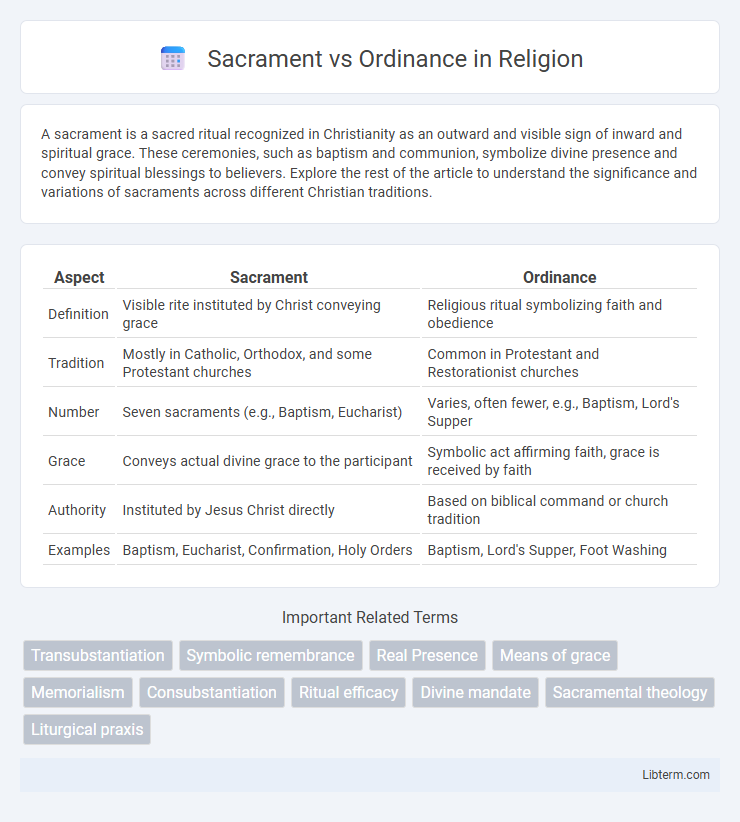A sacrament is a sacred ritual recognized in Christianity as an outward and visible sign of inward and spiritual grace. These ceremonies, such as baptism and communion, symbolize divine presence and convey spiritual blessings to believers. Explore the rest of the article to understand the significance and variations of sacraments across different Christian traditions.
Table of Comparison
| Aspect | Sacrament | Ordinance |
|---|---|---|
| Definition | Visible rite instituted by Christ conveying grace | Religious ritual symbolizing faith and obedience |
| Tradition | Mostly in Catholic, Orthodox, and some Protestant churches | Common in Protestant and Restorationist churches |
| Number | Seven sacraments (e.g., Baptism, Eucharist) | Varies, often fewer, e.g., Baptism, Lord's Supper |
| Grace | Conveys actual divine grace to the participant | Symbolic act affirming faith, grace is received by faith |
| Authority | Instituted by Jesus Christ directly | Based on biblical command or church tradition |
| Examples | Baptism, Eucharist, Confirmation, Holy Orders | Baptism, Lord's Supper, Foot Washing |
Understanding Sacrament and Ordinance
Sacrament and ordinance represent sacred rituals in Christian traditions, with sacraments typically recognized as essential, divinely instituted rites like baptism and Eucharist that convey grace. Ordinances are religious ceremonies or rites performed by the church, often seen in Protestant denominations as symbolic acts that affirm faith and obedience without necessarily imparting grace. Understanding the distinction hinges on theological context: sacraments are means of grace, while ordinances emphasize covenantal remembrance and commitment within various Christian doctrines.
Historical Origins of Sacraments and Ordinances
The historical origins of sacraments trace back to early Christian practices established by the apostles, emphasizing their role as visible signs instituted by Christ to confer grace. Ordinances, especially within Protestant traditions, emerged during the Reformation as symbolic acts commanded by Christ for obedience and community identity without the inherent conveyance of grace. This divergence highlights theological shifts from the medieval Church's sacramental system to the reformers' focus on scripture and faith.
Key Theological Differences
The key theological difference between a sacrament and an ordinance lies in their understood nature and efficacy: sacraments are viewed as outward means of grace instituted by Christ that confer divine grace upon the participant, while ordinances are symbolic acts of obedience that primarily serve as public testimonies of faith. Sacraments, such as baptism and the Eucharist in Catholic and Orthodox traditions, are believed to effect spiritual transformation through God's active presence. Ordinances, emphasized in many Protestant denominations, function as memorials and commitments without the inherent transmission of grace.
Christian Denominations and Their Views
Christian denominations vary in their understanding of sacrament and ordinance, reflecting theological differences on divine grace and symbolic acts. Catholic, Orthodox, and some Anglican traditions recognize sacraments as means of grace instituted by Christ, emphasizing their role in spiritual transformation. In contrast, many Protestant groups, including Baptists and Pentecostals, view ordinances like baptism and communion primarily as symbolic practices of obedience and communal identity.
Symbolism in Sacraments and Ordinances
Sacraments and ordinances both serve as sacred rites symbolizing spiritual truths and divine grace, yet sacraments often emphasize an inward grace imparted by God through the ritual itself, reflecting a deeper mystical presence. Ordinances predominantly symbolize obedience and public commitment, acting as visible signs of faith and covenant between the believer and God. The symbolism in sacraments tends to highlight transformation and sanctification, whereas ordinances focus more on community identity and remembrance of Christ's teachings.
Scriptural Foundations and References
Sacraments and ordinances both serve as sacred rites rooted in biblical tradition, with sacraments often viewed as outward signs instituted by Christ, such as baptism (Matthew 28:19) and the Eucharist (Luke 22:19-20), signifying inward spiritual grace. Ordinances, commonly emphasized in Protestant denominations, are acts commanded by Christ, including baptism (Acts 2:38) and the Lord's Supper (1 Corinthians 11:23-26), practiced as expressions of faith and obedience rather than means of grace. Scriptural foundations highlight the continuity and distinct theological interpretations, with sacraments linked to covenant theology and ordinances focusing on memorial and discipleship aspects.
The Role of Faith and Grace
The role of faith and grace in the distinction between sacrament and ordinance centers on their theological implications: sacraments are often viewed as means of grace, imparting divine favor through faith, while ordinances are symbolic acts requiring human commitment and obedience. In Christian traditions that emphasize sacraments, faith is essential for receiving the grace that transforms and sanctifies the believer. Ordinances, on the other hand, highlight the believer's active participation and faith response, underscoring grace as a gift accepted through personal dedication and covenantal obedience.
Rituals and Practices Explained
Sacraments, such as baptism and the Eucharist, are sacred rituals believed to convey divine grace through divine institution in many Christian traditions, emphasizing their spiritual significance and efficacy. Ordinances, commonly practiced in Protestant denominations, are symbolic acts like baptism and the Lord's Supper that serve as expressions of faith and obedience rather than channels of grace. Both sacraments and ordinances involve ritualistic practices including water immersion or pouring, bread and wine consumption, and liturgical prayers, but their theological interpretations differ significantly across Christian communities.
Contemporary Debates and Perspectives
Contemporary debates on Sacrament vs Ordinance revolve around theological interpretations and denominational distinctions, with Sacraments often viewed as means of grace essential to salvation, especially in Catholic, Orthodox, and some Protestant traditions. Ordinances are typically seen in Baptist and other evangelical contexts as symbolic acts of obedience and public testimony rather than vehicles of grace. These differing perspectives influence worship practices, ecclesiology, and the understanding of sacramental efficacy in modern Christian communities.
Spiritual Significance for Believers
The spiritual significance of sacraments lies in their role as outward, visible signs of inward, divine grace, often believed to confer God's grace upon the believer, reinforcing faith and sanctification. Ordinances, while also symbolizing important spiritual truths, emphasize obedience and community commitment without necessarily conveying grace directly. Understanding these distinctions deepens a believer's appreciation of how sacred rituals connect the individual to divine presence and communal identity.
Sacrament Infographic

 libterm.com
libterm.com